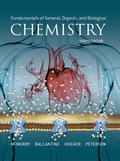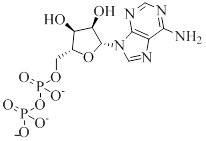
Interpretation:
The given options should be identified that whether they are found in the structure of coenzyme FAD.
Concept Introduction:
Flavin Adenine Dinucleotide
Coenzyme: They are non-proteins molecules which helps enzymes for catalyzing the reaction.
Enzyme: The proteins that helps
ADP contains adenine attached to sugar backbone and 2 phosphate groups get attached to five carbon atoms present in ribose. The structure is as follows,

Phosphate anhydride bond: The bond that keeps phosphate groups and ribose together is termed as phosphate anhydride bond.
Benzene: The molecule that has 6 carbon atoms present in a ring to which each carbon has one hydrogen atom with it.
Want to see the full answer?
Check out a sample textbook solution
Chapter 21 Solutions
EBK FUNDAMENTALS OF GENERAL, ORGANIC, A
- Background Freezing isn't the only challenge in cryopreservation - thawing can be just as difficult. A microwave oven seems like a nice solution, since it deposits energy quickly and microwaves are non-ionizing radiation (they do not cause DNA mutation). However, water absorbs microwaves more effectively than ice does, meaning that the portion of an organ that has already melted will get warmer at a higher rate than the remaining ice – the opposite of what we want! - The transmission of radiation through a weakly absorbing material such as ice or water can be modeled by Beer's law, which assumes that the rate of absorption at a depth x is proportional to the local radiation intensity I(x) times an absorption coefficient, which is often written as μ or a or just µ). Noting that absorption decreases the intensity, we can write a differential equation a Solving the differential equation with the boundary condition on the surface being gives the relationship For a standard microwave oven…arrow_forward3. Dry air is inhaled at a rate of 10 liter/min through a trachea with a diameter of 20 mm and a length of 125 mm. The inner surface of the trachea is at a normal body temperature of 37°C and may be assumed to be saturated with water. a. Assuming steady, fully developed flow in the trachea, estimate the mass transfer convection coefficient. b. Estimate the daily water loss (liter/day) associated with evaporation in the trachea.arrow_forward1. Conceptual questions a. What dimensionless group describes the relative importance of convection versus diffusion. Explain the physical basis of this group. b. For mass transfer from a flowing fluid to a reactive surface, explain how convection increases the flux of solute to the surface.arrow_forward
- Assessment +1501 pts /1600 Resources Solution ? Hint Sub bo Each pictured Lewis structure is invalid. Identify the error in each case. O Macmillan Learning :0▬▬0: Answer Bank wrong electron total :0- :F======F: octet-rule violation N :0:arrow_forward[s] mM V (M/s) Uninhibited 0.333 1.65 x 107 1.05 x 107 V (M/s) x 10' Inhibitor A V (M/s) x 107 Inhibitor B 0.794 x 107 0.40 1.86 x 107 1.21 x 107 0.893 x 107 0.50 2.13 x 107 1.43 x 107 1.02 x 107 0.666 2.49 x 107 1.74 x 107 1.19 x 107 1.0 2.99 x 107 2.22 x 107 1.43 x 107 2.0 3.72 x 107 3.08 x 107 1.79 x 107arrow_forwardFor a Michaelis-Menten reaction, k₁-5 x 10'/M-s, k.-2 x 10%/s, and k₂-4 x 10²/s. a) Calculate the Ks and KM for this reaction. b) Does substrate binding achieve equilibrium or steady state?arrow_forward
- Assume that an enzyme-catalyzed reaction follows the scheme shown: E+S SES →E + P k₁ = 1 x 109/M-s k-1=2.5 x 10%/s k₂ = 3.4 x 107/s What is the dissociation constant for the enzyme-substrate, K,? What is the Michaelis constant, Km, for this enzyme? What is the turnover number, Keat, for this enzyme? What is the catalytic efficiency for the enzyme? If the initial Et concentration is 0.25mM, what is Vmax?arrow_forwardAn enzyme lowers the activation energy, (AG) of a reaction from 50.0 kcal/mol to 40.0 kcal/mol. Calulate the catalytic power at 310K. (R-1.987x10 kcal/mol)arrow_forwardDraw a typical axodendritic synapse, including a specific neurotransmitter of your choice, its associated postsynaptic receptors (indicating whether they are ionotropic or metabotropic), and any associated reuptake transporters or degradation enzymes. Please include a description of what specific steps would occur as an action potential reaches the axonal terminal.arrow_forward
- Give a full arrow pushing mechanism of the spontaneous redox reaction between NAD+/NADH and oxaloacetate/malate. Please include diagram drawing of the mechanism! (Thank You!)arrow_forward18. Which one of the compounds below is the major organic product obtained from the following series of reactions? 1. BH3 2. H2O2, NaOH H₂CrO4 CH2N2 oro ororos A B C D Earrow_forward17. Which one of the compounds below is the major organic product obtained from the following series of reactions? CI benzyl alcohol OH PBr3 Mg 1. CO2 SOCl2 ? ether 2. H+, H₂O CI Cl HO OH CI Cl A B C D Earrow_forward
 Biology (MindTap Course List)BiologyISBN:9781337392938Author:Eldra Solomon, Charles Martin, Diana W. Martin, Linda R. BergPublisher:Cengage Learning
Biology (MindTap Course List)BiologyISBN:9781337392938Author:Eldra Solomon, Charles Martin, Diana W. Martin, Linda R. BergPublisher:Cengage Learning Human Heredity: Principles and Issues (MindTap Co...BiologyISBN:9781305251052Author:Michael CummingsPublisher:Cengage Learning
Human Heredity: Principles and Issues (MindTap Co...BiologyISBN:9781305251052Author:Michael CummingsPublisher:Cengage Learning BiochemistryBiochemistryISBN:9781305577206Author:Reginald H. Garrett, Charles M. GrishamPublisher:Cengage Learning
BiochemistryBiochemistryISBN:9781305577206Author:Reginald H. Garrett, Charles M. GrishamPublisher:Cengage Learning





